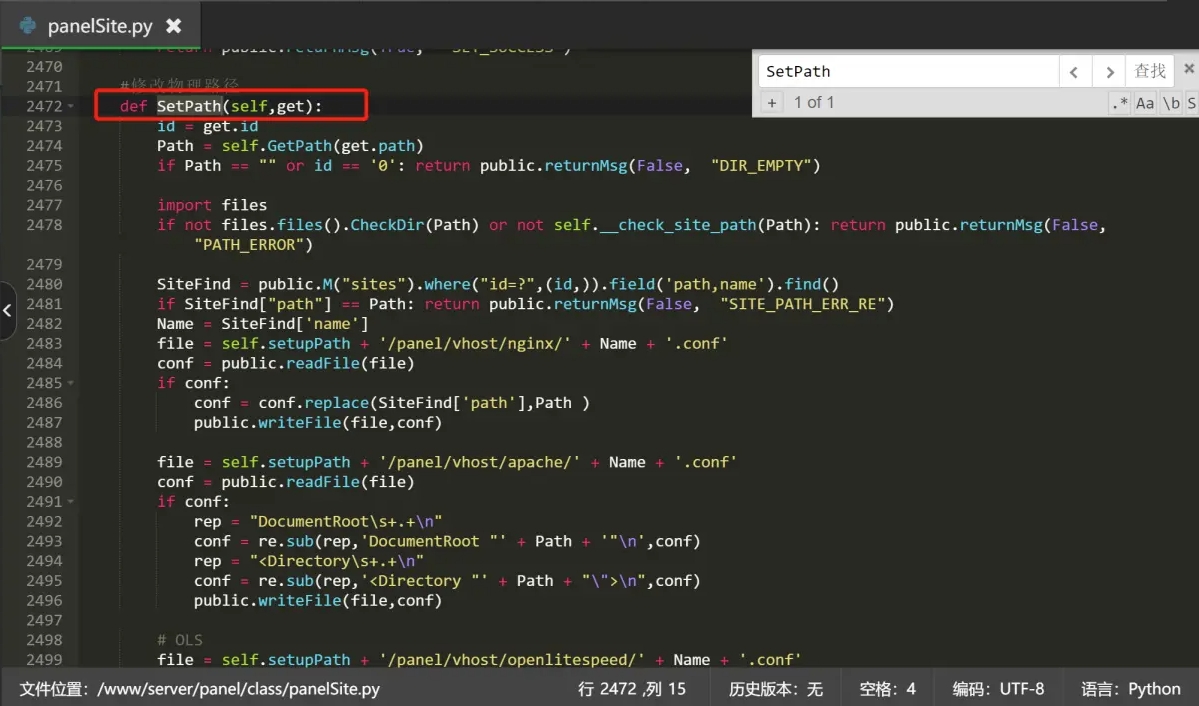搜索到
9
篇与
Linux
相关的结果
-

-

-
 云主机安装iKuai OS 准备:安装系统为Ubuntu系统开始安装iKuai OS下载ISO安装包# 32位 wget https://www.ikuai8.com/download.php?n=/3.x/iso/iKuai8_x32_3.5.11_Build202112031159.iso -O ikuai8.iso # 64位 wget https://www.ikuai8.com/download.php?n=/3.x/iso/iKuai8_x64_3.5.11_Build202112031159.iso -O ikuai8.iso挂载ISO镜像 sudo mount ikuai8.iso /mnt复制ISO镜像启动文件 sudo cp -rpf /mnt/boot /4.重启 reboot打开VNC界面: 登录/远程登录 --> VNC登录,正常ISO安装爱快系统进入控制台"开启外网访问WEB" o、其他选项 --> 2、开启外网访问web
云主机安装iKuai OS 准备:安装系统为Ubuntu系统开始安装iKuai OS下载ISO安装包# 32位 wget https://www.ikuai8.com/download.php?n=/3.x/iso/iKuai8_x32_3.5.11_Build202112031159.iso -O ikuai8.iso # 64位 wget https://www.ikuai8.com/download.php?n=/3.x/iso/iKuai8_x64_3.5.11_Build202112031159.iso -O ikuai8.iso挂载ISO镜像 sudo mount ikuai8.iso /mnt复制ISO镜像启动文件 sudo cp -rpf /mnt/boot /4.重启 reboot打开VNC界面: 登录/远程登录 --> VNC登录,正常ISO安装爱快系统进入控制台"开启外网访问WEB" o、其他选项 --> 2、开启外网访问web -
 Linux挂载硬盘 以/dev/vdb挂载到/www为例:# 创建 /www 文件夹 mkdir /www # 查看所有硬盘,有的是sda、sdb,有的是vda、vdb,根据自己的实际情况修改代码 fdisk -l # 硬盘分区 fdisk /dev/vdb # 默认一个分区,依次输入以下内容 n(回车)->p(回车)->(回车)->(回车)->wq(回车) # 格式化分区为EXT4格式 mkfs.ext4 /dev/vdb # 挂载硬盘到 /www mount /dev/vdb /www # 查看挂载是否成功 df -h当前设置为临时挂载,重启后挂载会失效,如需设置开机自动挂载,修改/etc/fstab# 编辑 /etc/fstab vi /etc/fstab # 在最后一行插入以下内容后保存 /dev/vdb /www ext4 defaults 0 0
Linux挂载硬盘 以/dev/vdb挂载到/www为例:# 创建 /www 文件夹 mkdir /www # 查看所有硬盘,有的是sda、sdb,有的是vda、vdb,根据自己的实际情况修改代码 fdisk -l # 硬盘分区 fdisk /dev/vdb # 默认一个分区,依次输入以下内容 n(回车)->p(回车)->(回车)->(回车)->wq(回车) # 格式化分区为EXT4格式 mkfs.ext4 /dev/vdb # 挂载硬盘到 /www mount /dev/vdb /www # 查看挂载是否成功 df -h当前设置为临时挂载,重启后挂载会失效,如需设置开机自动挂载,修改/etc/fstab# 编辑 /etc/fstab vi /etc/fstab # 在最后一行插入以下内容后保存 /dev/vdb /www ext4 defaults 0 0 -
 IPsec VPN 服务器一键安装脚本 安装方法一(账号密码随机生成)wget https://get.vpnsetup.net -O vpn.sh && sudo sh vpn.sh登录凭证将会被自动随机生成,并在安装完成后显示。安装方法二(账号密码自行设置)wget https://get.vpnsetup.net -O vpn.sh nano -w vpn.sh # [替换为你自己的值: YOUR_IPSEC_PSK, YOUR_USERNAME 和 YOUR_PASSWORD] # 所有变量值必须用 '单引号' 括起来 # VPN_IPSEC_PSK='你的IPsec预共享密钥' # VPN_USER='你的VPN用户名' # VPN_PASSWORD='你的VPN密码' sh vpn.sh{collapse}{collapse-item label="vpn.sh(点击展开)" }#!/bin/sh # # Script for automatic setup of an IPsec VPN server on Ubuntu, Debian, CentOS/RHEL, # Rocky Linux, AlmaLinux, Oracle Linux, Amazon Linux 2 and Alpine Linux # # DO NOT RUN THIS SCRIPT ON YOUR PC OR MAC! # # The latest version of this script is available at: # https://github.com/hwdsl2/setup-ipsec-vpn # # Copyright (C) 2021-2024 Lin Song <linsongui@gmail.com> # # This work is licensed under the Creative Commons Attribution-ShareAlike 3.0 # Unported License: http://creativecommons.org/licenses/by-sa/3.0/ # # Attribution required: please include my name in any derivative and let me # know how you have improved it! # ===================================================== # Define your own values for these variables # - IPsec pre-shared key, VPN username and password # - All values MUST be placed inside 'single quotes' # - DO NOT use these special characters within values: \ " ' YOUR_IPSEC_PSK='' YOUR_USERNAME='' YOUR_PASSWORD='' # ===================================================== export PATH="/usr/local/sbin:/usr/local/bin:/usr/sbin:/usr/bin:/sbin:/bin" exiterr() { echo "Error: $1" >&2; exit 1; } check_ip() { IP_REGEX='^(([0-9]|[1-9][0-9]|1[0-9]{2}|2[0-4][0-9]|25[0-5])\.){3}([0-9]|[1-9][0-9]|1[0-9]{2}|2[0-4][0-9]|25[0-5])$' printf '%s' "$1" | tr -d '\n' | grep -Eq "$IP_REGEX" } check_dns_name() { FQDN_REGEX='^([a-zA-Z0-9]([a-zA-Z0-9-]{0,61}[a-zA-Z0-9])?\.)+[a-zA-Z]{2,}$' printf '%s' "$1" | tr -d '\n' | grep -Eq "$FQDN_REGEX" } check_root() { if [ "$(id -u)" != 0 ]; then exiterr "Script must be run as root. Try 'sudo sh $0'" fi } check_vz() { if [ -f /proc/user_beancounters ]; then exiterr "OpenVZ VPS is not supported." fi } check_lxc() { # shellcheck disable=SC2154 if [ "$container" = "lxc" ] && [ ! -e /dev/ppp ]; then cat 1>&2 <<'EOF' Error: /dev/ppp is missing. LXC containers require configuration. See: https://github.com/hwdsl2/setup-ipsec-vpn/issues/1014 EOF exit 1 fi } check_os() { rh_file="/etc/redhat-release" if [ -f "$rh_file" ]; then os_type=centos if grep -q "Red Hat" "$rh_file"; then os_type=rhel fi [ -f /etc/oracle-release ] && os_type=ol grep -qi rocky "$rh_file" && os_type=rocky grep -qi alma "$rh_file" && os_type=alma if grep -q "release 7" "$rh_file"; then os_ver=7 elif grep -q "release 8" "$rh_file"; then os_ver=8 grep -qi stream "$rh_file" && os_ver=8s elif grep -q "release 9" "$rh_file"; then os_ver=9 grep -qi stream "$rh_file" && os_ver=9s else exiterr "This script only supports CentOS/RHEL 7-9." fi if [ "$os_type" = "centos" ] \ && { [ "$os_ver" = 7 ] || [ "$os_ver" = 8 ] || [ "$os_ver" = 8s ]; }; then exiterr "CentOS Linux $os_ver is EOL and not supported." fi elif grep -qs "Amazon Linux release 2 " /etc/system-release; then os_type=amzn os_ver=2 elif grep -qs "Amazon Linux release 2023" /etc/system-release; then exiterr "Amazon Linux 2023 is not supported." else os_type=$(lsb_release -si 2>/dev/null) [ -z "$os_type" ] && [ -f /etc/os-release ] && os_type=$(. /etc/os-release && printf '%s' "$ID") case $os_type in [Uu]buntu) os_type=ubuntu ;; [Dd]ebian|[Kk]ali) os_type=debian ;; [Rr]aspbian) os_type=raspbian ;; [Aa]lpine) os_type=alpine ;; *) cat 1>&2 <<'EOF' Error: This script only supports one of the following OS: Ubuntu, Debian, CentOS/RHEL, Rocky Linux, AlmaLinux, Oracle Linux, Amazon Linux 2 or Alpine Linux EOF exit 1 ;; esac if [ "$os_type" = "alpine" ]; then os_ver=$(. /etc/os-release && printf '%s' "$VERSION_ID" | cut -d '.' -f 1,2) if [ "$os_ver" != "3.19" ] && [ "$os_ver" != "3.20" ]; then exiterr "This script only supports Alpine Linux 3.19/3.20." fi else os_ver=$(sed 's/\..*//' /etc/debian_version | tr -dc 'A-Za-z0-9') if [ "$os_ver" = 8 ] || [ "$os_ver" = 9 ] || [ "$os_ver" = "jessiesid" ] \ || [ "$os_ver" = "bustersid" ]; then cat 1>&2 <<EOF Error: This script requires Debian >= 10 or Ubuntu >= 20.04. This version of Ubuntu/Debian is too old and not supported. EOF exit 1 fi fi fi } check_iface() { def_iface=$(route 2>/dev/null | grep -m 1 '^default' | grep -o '[^ ]*$') if [ "$os_type" != "alpine" ]; then [ -z "$def_iface" ] && def_iface=$(ip -4 route list 0/0 2>/dev/null | grep -m 1 -Po '(?<=dev )(\S+)') fi def_state=$(cat "/sys/class/net/$def_iface/operstate" 2>/dev/null) check_wl=0 if [ -n "$def_state" ] && [ "$def_state" != "down" ]; then if [ "$os_type" = "ubuntu" ] || [ "$os_type" = "debian" ] || [ "$os_type" = "raspbian" ]; then if ! uname -m | grep -qi -e '^arm' -e '^aarch64'; then check_wl=1 fi else check_wl=1 fi fi if [ "$check_wl" = 1 ]; then case $def_iface in wl*) exiterr "Wireless interface '$def_iface' detected. DO NOT run this script on your PC or Mac!" ;; esac fi } check_creds() { [ -n "$YOUR_IPSEC_PSK" ] && VPN_IPSEC_PSK="$YOUR_IPSEC_PSK" [ -n "$YOUR_USERNAME" ] && VPN_USER="$YOUR_USERNAME" [ -n "$YOUR_PASSWORD" ] && VPN_PASSWORD="$YOUR_PASSWORD" if [ -z "$VPN_IPSEC_PSK" ] && [ -z "$VPN_USER" ] && [ -z "$VPN_PASSWORD" ]; then return 0 fi if [ -z "$VPN_IPSEC_PSK" ] || [ -z "$VPN_USER" ] || [ -z "$VPN_PASSWORD" ]; then exiterr "All VPN credentials must be specified. Edit the script and re-enter them." fi if printf '%s' "$VPN_IPSEC_PSK $VPN_USER $VPN_PASSWORD" | LC_ALL=C grep -q '[^ -~]\+'; then exiterr "VPN credentials must not contain non-ASCII characters." fi case "$VPN_IPSEC_PSK $VPN_USER $VPN_PASSWORD" in *[\\\"\']*) exiterr "VPN credentials must not contain these special characters: \\ \" '" ;; esac } check_dns() { if { [ -n "$VPN_DNS_SRV1" ] && ! check_ip "$VPN_DNS_SRV1"; } \ || { [ -n "$VPN_DNS_SRV2" ] && ! check_ip "$VPN_DNS_SRV2"; }; then exiterr "The DNS server specified is invalid." fi } check_server_dns() { if [ -n "$VPN_DNS_NAME" ] && ! check_dns_name "$VPN_DNS_NAME"; then exiterr "Invalid DNS name. 'VPN_DNS_NAME' must be a fully qualified domain name (FQDN)." fi } check_client_name() { if [ -n "$VPN_CLIENT_NAME" ]; then name_len="$(printf '%s' "$VPN_CLIENT_NAME" | wc -m)" if [ "$name_len" -gt "64" ] || printf '%s' "$VPN_CLIENT_NAME" | LC_ALL=C grep -q '[^A-Za-z0-9_-]\+' \ || case $VPN_CLIENT_NAME in -*) true ;; *) false ;; esac; then exiterr "Invalid client name. Use one word only, no special characters except '-' and '_'." fi fi } wait_for_apt() { count=0 apt_lk=/var/lib/apt/lists/lock pkg_lk=/var/lib/dpkg/lock while fuser "$apt_lk" "$pkg_lk" >/dev/null 2>&1 \ || lsof "$apt_lk" >/dev/null 2>&1 || lsof "$pkg_lk" >/dev/null 2>&1; do [ "$count" = 0 ] && echo "## Waiting for apt to be available..." [ "$count" -ge 100 ] && exiterr "Could not get apt/dpkg lock." count=$((count+1)) printf '%s' '.' sleep 3 done } install_pkgs() { if ! command -v wget >/dev/null 2>&1; then if [ "$os_type" = "ubuntu" ] || [ "$os_type" = "debian" ] || [ "$os_type" = "raspbian" ]; then wait_for_apt export DEBIAN_FRONTEND=noninteractive ( set -x apt-get -yqq update || apt-get -yqq update ) || exiterr "'apt-get update' failed." ( set -x apt-get -yqq install wget >/dev/null || apt-get -yqq install wget >/dev/null ) || exiterr "'apt-get install wget' failed." elif [ "$os_type" != "alpine" ]; then ( set -x yum -y -q install wget >/dev/null || yum -y -q install wget >/dev/null ) || exiterr "'yum install wget' failed." fi fi if [ "$os_type" = "alpine" ]; then ( set -x apk add -U -q bash coreutils grep net-tools sed wget ) || exiterr "'apk add' failed." fi } get_setup_url() { base_url1="https://raw.githubusercontent.com/hwdsl2/setup-ipsec-vpn/master" base_url2="https://gitlab.com/hwdsl2/setup-ipsec-vpn/-/raw/master" sh_file="vpnsetup_ubuntu.sh" if [ "$os_type" = "centos" ] || [ "$os_type" = "rhel" ] || [ "$os_type" = "rocky" ] \ || [ "$os_type" = "alma" ] || [ "$os_type" = "ol" ]; then sh_file="vpnsetup_centos.sh" elif [ "$os_type" = "amzn" ]; then sh_file="vpnsetup_amzn.sh" elif [ "$os_type" = "alpine" ]; then sh_file="vpnsetup_alpine.sh" fi setup_url1="$base_url1/$sh_file" setup_url2="$base_url2/$sh_file" } run_setup() { status=0 if tmpdir=$(mktemp --tmpdir -d vpn.XXXXX 2>/dev/null); then if ( set -x; wget -t 3 -T 30 -q -O "$tmpdir/vpn.sh" "$setup_url1" \ || wget -t 3 -T 30 -q -O "$tmpdir/vpn.sh" "$setup_url2" \ || curl -m 30 -fsL "$setup_url1" -o "$tmpdir/vpn.sh" 2>/dev/null ); then VPN_IPSEC_PSK="$VPN_IPSEC_PSK" VPN_USER="$VPN_USER" \ VPN_PASSWORD="$VPN_PASSWORD" \ VPN_PUBLIC_IP="$VPN_PUBLIC_IP" VPN_L2TP_NET="$VPN_L2TP_NET" \ VPN_L2TP_LOCAL="$VPN_L2TP_LOCAL" VPN_L2TP_POOL="$VPN_L2TP_POOL" \ VPN_XAUTH_NET="$VPN_XAUTH_NET" VPN_XAUTH_POOL="$VPN_XAUTH_POOL" \ VPN_DNS_SRV1="$VPN_DNS_SRV1" VPN_DNS_SRV2="$VPN_DNS_SRV2" \ VPN_DNS_NAME="$VPN_DNS_NAME" VPN_CLIENT_NAME="$VPN_CLIENT_NAME" \ VPN_PROTECT_CONFIG="$VPN_PROTECT_CONFIG" \ VPN_CLIENT_VALIDITY="$VPN_CLIENT_VALIDITY" \ VPN_SKIP_IKEV2="$VPN_SKIP_IKEV2" VPN_SWAN_VER="$VPN_SWAN_VER" \ /bin/bash "$tmpdir/vpn.sh" || status=1 else status=1 echo "Error: Could not download VPN setup script." >&2 fi /bin/rm -f "$tmpdir/vpn.sh" /bin/rmdir "$tmpdir" else exiterr "Could not create temporary directory." fi } vpnsetup() { check_root check_vz check_lxc check_os check_iface check_creds check_dns check_server_dns check_client_name install_pkgs get_setup_url run_setup } ## Defer setup until we have the complete script vpnsetup "$@" exit "$status"{/collapse-item}{/collapse}
IPsec VPN 服务器一键安装脚本 安装方法一(账号密码随机生成)wget https://get.vpnsetup.net -O vpn.sh && sudo sh vpn.sh登录凭证将会被自动随机生成,并在安装完成后显示。安装方法二(账号密码自行设置)wget https://get.vpnsetup.net -O vpn.sh nano -w vpn.sh # [替换为你自己的值: YOUR_IPSEC_PSK, YOUR_USERNAME 和 YOUR_PASSWORD] # 所有变量值必须用 '单引号' 括起来 # VPN_IPSEC_PSK='你的IPsec预共享密钥' # VPN_USER='你的VPN用户名' # VPN_PASSWORD='你的VPN密码' sh vpn.sh{collapse}{collapse-item label="vpn.sh(点击展开)" }#!/bin/sh # # Script for automatic setup of an IPsec VPN server on Ubuntu, Debian, CentOS/RHEL, # Rocky Linux, AlmaLinux, Oracle Linux, Amazon Linux 2 and Alpine Linux # # DO NOT RUN THIS SCRIPT ON YOUR PC OR MAC! # # The latest version of this script is available at: # https://github.com/hwdsl2/setup-ipsec-vpn # # Copyright (C) 2021-2024 Lin Song <linsongui@gmail.com> # # This work is licensed under the Creative Commons Attribution-ShareAlike 3.0 # Unported License: http://creativecommons.org/licenses/by-sa/3.0/ # # Attribution required: please include my name in any derivative and let me # know how you have improved it! # ===================================================== # Define your own values for these variables # - IPsec pre-shared key, VPN username and password # - All values MUST be placed inside 'single quotes' # - DO NOT use these special characters within values: \ " ' YOUR_IPSEC_PSK='' YOUR_USERNAME='' YOUR_PASSWORD='' # ===================================================== export PATH="/usr/local/sbin:/usr/local/bin:/usr/sbin:/usr/bin:/sbin:/bin" exiterr() { echo "Error: $1" >&2; exit 1; } check_ip() { IP_REGEX='^(([0-9]|[1-9][0-9]|1[0-9]{2}|2[0-4][0-9]|25[0-5])\.){3}([0-9]|[1-9][0-9]|1[0-9]{2}|2[0-4][0-9]|25[0-5])$' printf '%s' "$1" | tr -d '\n' | grep -Eq "$IP_REGEX" } check_dns_name() { FQDN_REGEX='^([a-zA-Z0-9]([a-zA-Z0-9-]{0,61}[a-zA-Z0-9])?\.)+[a-zA-Z]{2,}$' printf '%s' "$1" | tr -d '\n' | grep -Eq "$FQDN_REGEX" } check_root() { if [ "$(id -u)" != 0 ]; then exiterr "Script must be run as root. Try 'sudo sh $0'" fi } check_vz() { if [ -f /proc/user_beancounters ]; then exiterr "OpenVZ VPS is not supported." fi } check_lxc() { # shellcheck disable=SC2154 if [ "$container" = "lxc" ] && [ ! -e /dev/ppp ]; then cat 1>&2 <<'EOF' Error: /dev/ppp is missing. LXC containers require configuration. See: https://github.com/hwdsl2/setup-ipsec-vpn/issues/1014 EOF exit 1 fi } check_os() { rh_file="/etc/redhat-release" if [ -f "$rh_file" ]; then os_type=centos if grep -q "Red Hat" "$rh_file"; then os_type=rhel fi [ -f /etc/oracle-release ] && os_type=ol grep -qi rocky "$rh_file" && os_type=rocky grep -qi alma "$rh_file" && os_type=alma if grep -q "release 7" "$rh_file"; then os_ver=7 elif grep -q "release 8" "$rh_file"; then os_ver=8 grep -qi stream "$rh_file" && os_ver=8s elif grep -q "release 9" "$rh_file"; then os_ver=9 grep -qi stream "$rh_file" && os_ver=9s else exiterr "This script only supports CentOS/RHEL 7-9." fi if [ "$os_type" = "centos" ] \ && { [ "$os_ver" = 7 ] || [ "$os_ver" = 8 ] || [ "$os_ver" = 8s ]; }; then exiterr "CentOS Linux $os_ver is EOL and not supported." fi elif grep -qs "Amazon Linux release 2 " /etc/system-release; then os_type=amzn os_ver=2 elif grep -qs "Amazon Linux release 2023" /etc/system-release; then exiterr "Amazon Linux 2023 is not supported." else os_type=$(lsb_release -si 2>/dev/null) [ -z "$os_type" ] && [ -f /etc/os-release ] && os_type=$(. /etc/os-release && printf '%s' "$ID") case $os_type in [Uu]buntu) os_type=ubuntu ;; [Dd]ebian|[Kk]ali) os_type=debian ;; [Rr]aspbian) os_type=raspbian ;; [Aa]lpine) os_type=alpine ;; *) cat 1>&2 <<'EOF' Error: This script only supports one of the following OS: Ubuntu, Debian, CentOS/RHEL, Rocky Linux, AlmaLinux, Oracle Linux, Amazon Linux 2 or Alpine Linux EOF exit 1 ;; esac if [ "$os_type" = "alpine" ]; then os_ver=$(. /etc/os-release && printf '%s' "$VERSION_ID" | cut -d '.' -f 1,2) if [ "$os_ver" != "3.19" ] && [ "$os_ver" != "3.20" ]; then exiterr "This script only supports Alpine Linux 3.19/3.20." fi else os_ver=$(sed 's/\..*//' /etc/debian_version | tr -dc 'A-Za-z0-9') if [ "$os_ver" = 8 ] || [ "$os_ver" = 9 ] || [ "$os_ver" = "jessiesid" ] \ || [ "$os_ver" = "bustersid" ]; then cat 1>&2 <<EOF Error: This script requires Debian >= 10 or Ubuntu >= 20.04. This version of Ubuntu/Debian is too old and not supported. EOF exit 1 fi fi fi } check_iface() { def_iface=$(route 2>/dev/null | grep -m 1 '^default' | grep -o '[^ ]*$') if [ "$os_type" != "alpine" ]; then [ -z "$def_iface" ] && def_iface=$(ip -4 route list 0/0 2>/dev/null | grep -m 1 -Po '(?<=dev )(\S+)') fi def_state=$(cat "/sys/class/net/$def_iface/operstate" 2>/dev/null) check_wl=0 if [ -n "$def_state" ] && [ "$def_state" != "down" ]; then if [ "$os_type" = "ubuntu" ] || [ "$os_type" = "debian" ] || [ "$os_type" = "raspbian" ]; then if ! uname -m | grep -qi -e '^arm' -e '^aarch64'; then check_wl=1 fi else check_wl=1 fi fi if [ "$check_wl" = 1 ]; then case $def_iface in wl*) exiterr "Wireless interface '$def_iface' detected. DO NOT run this script on your PC or Mac!" ;; esac fi } check_creds() { [ -n "$YOUR_IPSEC_PSK" ] && VPN_IPSEC_PSK="$YOUR_IPSEC_PSK" [ -n "$YOUR_USERNAME" ] && VPN_USER="$YOUR_USERNAME" [ -n "$YOUR_PASSWORD" ] && VPN_PASSWORD="$YOUR_PASSWORD" if [ -z "$VPN_IPSEC_PSK" ] && [ -z "$VPN_USER" ] && [ -z "$VPN_PASSWORD" ]; then return 0 fi if [ -z "$VPN_IPSEC_PSK" ] || [ -z "$VPN_USER" ] || [ -z "$VPN_PASSWORD" ]; then exiterr "All VPN credentials must be specified. Edit the script and re-enter them." fi if printf '%s' "$VPN_IPSEC_PSK $VPN_USER $VPN_PASSWORD" | LC_ALL=C grep -q '[^ -~]\+'; then exiterr "VPN credentials must not contain non-ASCII characters." fi case "$VPN_IPSEC_PSK $VPN_USER $VPN_PASSWORD" in *[\\\"\']*) exiterr "VPN credentials must not contain these special characters: \\ \" '" ;; esac } check_dns() { if { [ -n "$VPN_DNS_SRV1" ] && ! check_ip "$VPN_DNS_SRV1"; } \ || { [ -n "$VPN_DNS_SRV2" ] && ! check_ip "$VPN_DNS_SRV2"; }; then exiterr "The DNS server specified is invalid." fi } check_server_dns() { if [ -n "$VPN_DNS_NAME" ] && ! check_dns_name "$VPN_DNS_NAME"; then exiterr "Invalid DNS name. 'VPN_DNS_NAME' must be a fully qualified domain name (FQDN)." fi } check_client_name() { if [ -n "$VPN_CLIENT_NAME" ]; then name_len="$(printf '%s' "$VPN_CLIENT_NAME" | wc -m)" if [ "$name_len" -gt "64" ] || printf '%s' "$VPN_CLIENT_NAME" | LC_ALL=C grep -q '[^A-Za-z0-9_-]\+' \ || case $VPN_CLIENT_NAME in -*) true ;; *) false ;; esac; then exiterr "Invalid client name. Use one word only, no special characters except '-' and '_'." fi fi } wait_for_apt() { count=0 apt_lk=/var/lib/apt/lists/lock pkg_lk=/var/lib/dpkg/lock while fuser "$apt_lk" "$pkg_lk" >/dev/null 2>&1 \ || lsof "$apt_lk" >/dev/null 2>&1 || lsof "$pkg_lk" >/dev/null 2>&1; do [ "$count" = 0 ] && echo "## Waiting for apt to be available..." [ "$count" -ge 100 ] && exiterr "Could not get apt/dpkg lock." count=$((count+1)) printf '%s' '.' sleep 3 done } install_pkgs() { if ! command -v wget >/dev/null 2>&1; then if [ "$os_type" = "ubuntu" ] || [ "$os_type" = "debian" ] || [ "$os_type" = "raspbian" ]; then wait_for_apt export DEBIAN_FRONTEND=noninteractive ( set -x apt-get -yqq update || apt-get -yqq update ) || exiterr "'apt-get update' failed." ( set -x apt-get -yqq install wget >/dev/null || apt-get -yqq install wget >/dev/null ) || exiterr "'apt-get install wget' failed." elif [ "$os_type" != "alpine" ]; then ( set -x yum -y -q install wget >/dev/null || yum -y -q install wget >/dev/null ) || exiterr "'yum install wget' failed." fi fi if [ "$os_type" = "alpine" ]; then ( set -x apk add -U -q bash coreutils grep net-tools sed wget ) || exiterr "'apk add' failed." fi } get_setup_url() { base_url1="https://raw.githubusercontent.com/hwdsl2/setup-ipsec-vpn/master" base_url2="https://gitlab.com/hwdsl2/setup-ipsec-vpn/-/raw/master" sh_file="vpnsetup_ubuntu.sh" if [ "$os_type" = "centos" ] || [ "$os_type" = "rhel" ] || [ "$os_type" = "rocky" ] \ || [ "$os_type" = "alma" ] || [ "$os_type" = "ol" ]; then sh_file="vpnsetup_centos.sh" elif [ "$os_type" = "amzn" ]; then sh_file="vpnsetup_amzn.sh" elif [ "$os_type" = "alpine" ]; then sh_file="vpnsetup_alpine.sh" fi setup_url1="$base_url1/$sh_file" setup_url2="$base_url2/$sh_file" } run_setup() { status=0 if tmpdir=$(mktemp --tmpdir -d vpn.XXXXX 2>/dev/null); then if ( set -x; wget -t 3 -T 30 -q -O "$tmpdir/vpn.sh" "$setup_url1" \ || wget -t 3 -T 30 -q -O "$tmpdir/vpn.sh" "$setup_url2" \ || curl -m 30 -fsL "$setup_url1" -o "$tmpdir/vpn.sh" 2>/dev/null ); then VPN_IPSEC_PSK="$VPN_IPSEC_PSK" VPN_USER="$VPN_USER" \ VPN_PASSWORD="$VPN_PASSWORD" \ VPN_PUBLIC_IP="$VPN_PUBLIC_IP" VPN_L2TP_NET="$VPN_L2TP_NET" \ VPN_L2TP_LOCAL="$VPN_L2TP_LOCAL" VPN_L2TP_POOL="$VPN_L2TP_POOL" \ VPN_XAUTH_NET="$VPN_XAUTH_NET" VPN_XAUTH_POOL="$VPN_XAUTH_POOL" \ VPN_DNS_SRV1="$VPN_DNS_SRV1" VPN_DNS_SRV2="$VPN_DNS_SRV2" \ VPN_DNS_NAME="$VPN_DNS_NAME" VPN_CLIENT_NAME="$VPN_CLIENT_NAME" \ VPN_PROTECT_CONFIG="$VPN_PROTECT_CONFIG" \ VPN_CLIENT_VALIDITY="$VPN_CLIENT_VALIDITY" \ VPN_SKIP_IKEV2="$VPN_SKIP_IKEV2" VPN_SWAN_VER="$VPN_SWAN_VER" \ /bin/bash "$tmpdir/vpn.sh" || status=1 else status=1 echo "Error: Could not download VPN setup script." >&2 fi /bin/rm -f "$tmpdir/vpn.sh" /bin/rmdir "$tmpdir" else exiterr "Could not create temporary directory." fi } vpnsetup() { check_root check_vz check_lxc check_os check_iface check_creds check_dns check_server_dns check_client_name install_pkgs get_setup_url run_setup } ## Defer setup until we have the complete script vpnsetup "$@" exit "$status"{/collapse-item}{/collapse}






